If you know of a Columbia College student, faculty member, alumnus/alumna or program we should spotlight, or if you would like to submit a story, please contact:
Columbia College
Office of Communications
cc-comms@columbia.edu
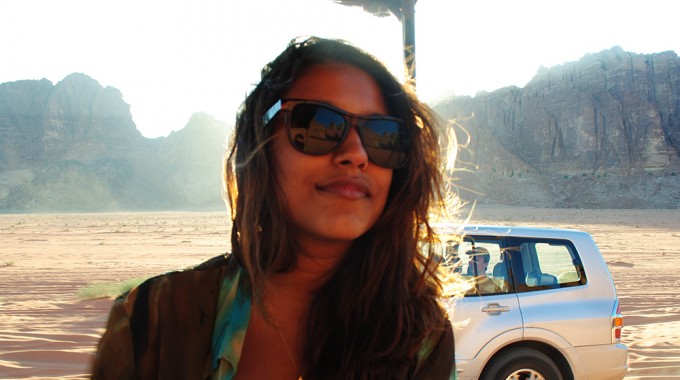
“My experience in Amman was more than just an internship; it helped me realize the direction in which I want to guide my career after graduation.” — Meghna Mukherjee CC’15
This summer, Meghna Mukherjee CC’15 interned with the King Hussein Foundation in Amman, Jordan, through her participation in the Center for Career Education's CEO Amman program. Below, she shares her reflections on her time abroad, and the ways in which her experiences have informed her plans for the future.
Care-free college summers are the best time to delve into a new and challenging experience, and there is no better way of doing that than picking up and moving across the world for a few months. I had completed and thoroughly enjoyed a Columbia Experience Overseas (CEO) program in Mumbai, India during the summer of 2013, so this summer I tried my luck by applying for another exciting adventure — Columbia’s CEO Amman program, which offered both a chance to spend the summer abroad and the opportunity to build career experience through a variety of internship opportunities. I am originally from India, and although I spent much of my childhood in various countries in the Middle East, it struck me that I had never really ventured out of the Gulf region. In light of this, Amman offered a fresh experience.
I was first introduced to Jordan while attending high school 700 miles away in Saudi Arabia. Coincidentally, or perhaps due to a Palestinian-Jordanian-Saudi immigration pattern, the majority of my friends attending the American School in Riyadh were Jordanian, and they emulated the essence of Arab hospitality. Over the years, I was invited to many of their dinner parties, where I would try handmade Jordanian delicacies and listen to them share fond memories of home. Hearing my friends describe Jordan made me want to experience the country for myself. Since I had not had the opportunity to do so while in high school, I figured that the CEO Amman program was the perfect chance.
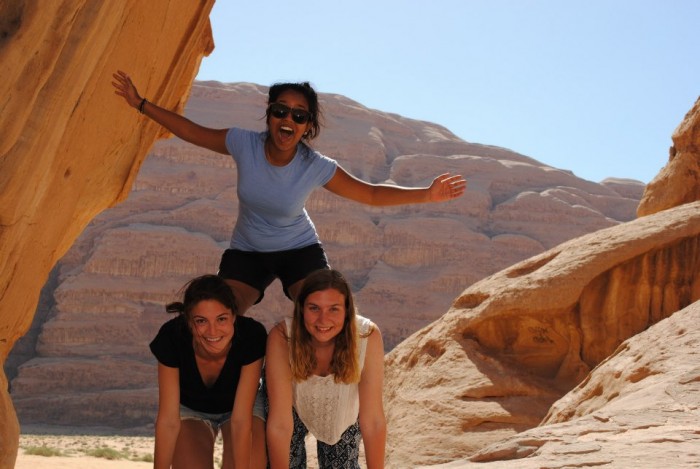 Meghna (top) with Allison Kammert CC’15 (left) and Kiersten Gourlay SEAS’15 (right). Photo: Jonah Richard CC’15, courtesy Meghna Mukherjee CC’15
Meghna (top) with Allison Kammert CC’15 (left) and Kiersten Gourlay SEAS’15 (right). Photo: Jonah Richard CC’15, courtesy Meghna Mukherjee CC’15
Jordan is an Arab country like none other I have visited — a fond amalgam of Amman’s city life coupled with the greenery, mountains and seas of the neighboring governorates. Amman is built on seven hills — jabals in Arabic —which act as landmarks for directions and provide mesmerizing views of the entire city should you ever find yourself conveniently poised on one of the peaks. Unlike the Big Apple that never sleeps, Amman claims a more peaceful urban life and maintains a reasonable bedtime. Just a few hours beyond the city, Jordan offers an outstanding relationship with nature. From the wadis with their towering mountains and racing rivers, to the Red and Dead Seas with their respective under- and over-water experiences, I was continually amazed by the beautiful strangeness of Jordan’s terrain.
While in Amman, I interned with the King Hussein Foundation, a prominent human rights, development and social justice-oriented organization founded by royal decree in 1999 to honor the late King Hussein, a dedicated champion of national progress and educational attainment. Queen Noor Al-Hussein, King Hussein’s widow, is now the chairperson of the organization, which operates throughout Jordan and its neighboring countries, including the United Arab Emirates, Qatar and Syria. The organization has generated several pioneering mobile healthcare systems, STEM education programs, and cultural and arts educational programs that are recognized and implemented as regional models. The King Hussein Foundation International has its headquarters in Virginia, and focuses mainly on recognizing outstanding global leaders. Over the years it has presented awards to, among others, Nobel Peace Prize winners Muhammad Yunus and Desmond Tutu.
Because of a personal interest in human rights and global development, I had been following the King Hussein Foundation for years, intrigued by their commitment to development on all fronts of human empowerment and justice, and their embrace of a sustainable approach that does not rely on simple charity, but instead fosters socioeconomic development and leadership from within a community – helping others to help themselves. As a communications and fundraising intern this summer, I honed existing communication and research skills I had gained from prior internships, but for the first time had a chance to use them within a human rights and development framework.
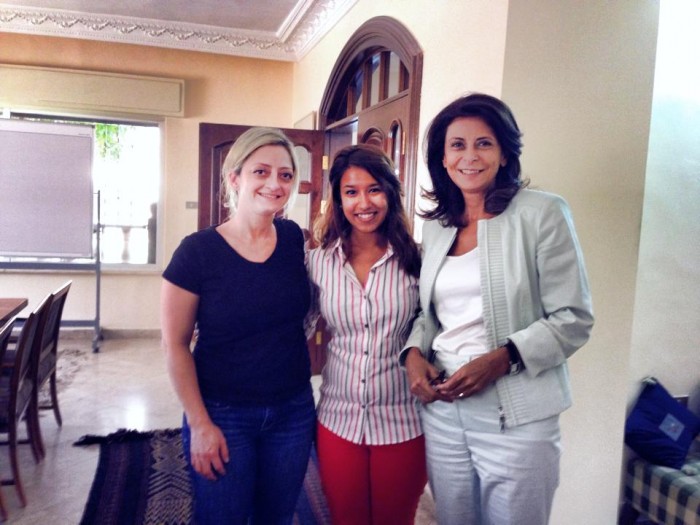 Meghna (center) with her supervisors at the King Hussein Foundation. Photo:Brina Seidel, courtesy Meghna Mukherjee CC’15
Meghna (center) with her supervisors at the King Hussein Foundation. Photo:Brina Seidel, courtesy Meghna Mukherjee CC’15
My main focus was the renovation of the organization's website. I was responsible for creating an online platform that would enhance the organization’s outreach and transparency in connection to donors, beneficiaries and partners. This also presented an opportunity to develop a fundraising scheme that would incorporate local Jordanian involvement to sustain the organization's education institute, intended to reach out to organizations and corporations as well as individual donors. This project allowed me to engage thoroughly with the foundation and the services and individual goals of its seven programmatic institutions, which cover various fields of human rights development, including education, health, and arts and culture.. Along with working on other communications projects, I was also required to develop communication strategies for large events, including Her Majesty Queen Noor's visit to the Emirates Jordanian Camp for Syrian Refugees in the outskirts of Amman, and the Science Expo Asia in August 2014, which was hosted in Amman this year.
Through my internship, I joined Her Majesty Queen Noor on her August visit to the Emirates Jordanian Camp (EJC), a refugee facility for civilians who have fled Syria over the past several years of turmoil. The visit left me with an overwhelming sense of amazement. The camp is directed by the government of the United Arab Emirates, and hosts education and health services provided by the King Hussein Foundation, whose work at EJC focuses on general health, reproductive health and gender-based violence prevention and response, women's health, and special needs education. Often called a five-star refugee camp, EJC has complete health facilities, high security, entertainment and leisure facilities, and provides each family a comfortable trailer home to themselves. From what I understand, this is unusual and fortunate compared to other refugee camps.
My responsibility during the visit to EJC was to accompany Her Majesty Queen Noor, taking pictures and live-tweeting about her visit to the refugee camp. It was inspiring to see how passionate Her Majesty was about the work of the foundation. She took an hour-long walking tour, discussing all the services with the camp directors and doctors, and took every possible moment to stop and engage with the residents, warmly welcoming the children who crowded around her.
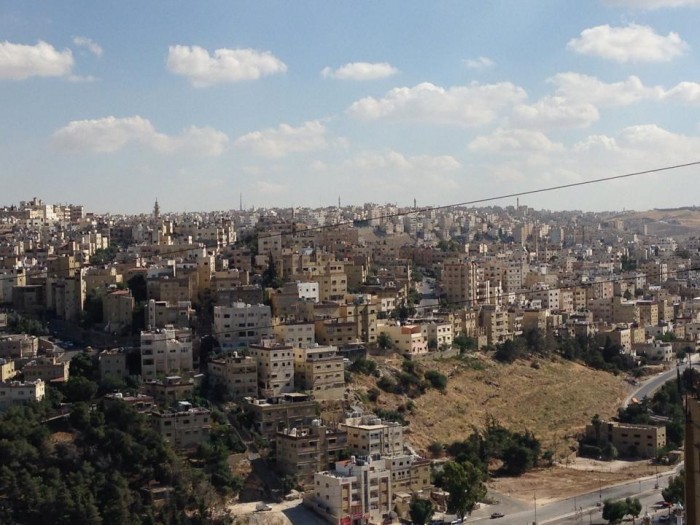 A view of Amman from Meghna's neighborhood. Photo: Courtesy Meghna Mukherjee CC’15
A view of Amman from Meghna's neighborhood. Photo: Courtesy Meghna Mukherjee CC’15
After my duties for the day had ended, I spent a few hours on my own with the children from the camp. Given the smiles, laughter and welcoming attitudes of the youngsters, one could not imagine that within their first 10 years (or for some, less than 10 years) of life they had already experienced the worst of wars and human suffering. They had fled their country, leaving behind friends and families, but were still able to embrace me, a stranger to the camp they called home. They showed off their bilingual skills as we exchanged notes in English and Arabic, and they laughed as I stumbled over my words and we made sense of our inability to comprehend each other's sentences. We sang songs in English, Arabic and even Hindi, my native tongue, which the children were surprisingly able to imitate thanks to popular Bollywood movies they had seen. I left the camp humbled by the human ability to be resilient and hopeful, even in the face of adversity.
Over the course of the summer, I also came in contact with the nation's socio-political-economic issues. Ramadan — the holy month where Muslims fast during daylight hours, which this year was in July — characterized my experience. The month brought slower days and lively evenings, as the city turned nocturnal after Iftar — the evening breakfast — with cheers and flags supporting the World Cup. Working through Ramadan was a challenge; shorter working hours did not mean less work, and afternoons waiting for Iftar were uneventful. There was no longer anyone smoking on the streets, all food outlets were closed and even the tiniest sip of water in public was a huge infraction. It was never completely clear whether eating in public at this time was illegal, but word was that people had been severely reprimanded and even arrested by law enforcement for doing so. Unlike being in school or living at home during Ramadan, as I had done throughout my childhood, I had to learn to cope with the changed pace of work and to be creative with how to use the rest of my day once work ended, a period mostly taken up by the struggle of finding food in a city where most food establishments were closed for Ramadan.
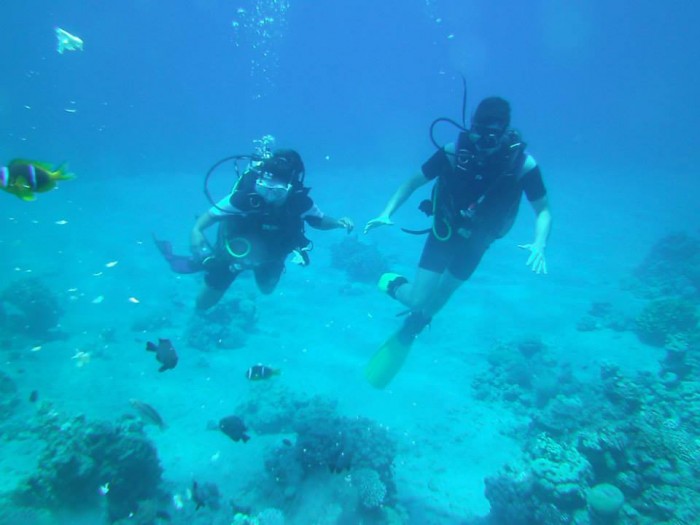 Meghna (left) and Jordan Richard CC’15 scuba dive in the Red Sea in Aqaba, Jordan. Photo: Courtesy Meghna Mukherjee CC’15
Meghna (left) and Jordan Richard CC’15 scuba dive in the Red Sea in Aqaba, Jordan. Photo: Courtesy Meghna Mukherjee CC’15
Having grown up with a respect for Ramadan and an inadvertent observance of the holiday, I can say that regardless of whether or not one fasts it remains an enlightening experience. Most practicing Muslims will say that Ramadan can be a great lesson to enhance tolerance and utmost respect toward oneself and those around you. In general, in the Middle East it is important to make sure that one is courteous and understanding of the obligations of the Holy Month, adjusting expectations of regular daily routines and interactions accordingly. Jordan has a largely Muslim and Christian population, and a sharp division between the two faiths surfaces during Ramadan. I recall being offered tea during an afternoon meeting with a web developer, who I knew was fasting. The more I declined, the more he insisted. Finally I gave in; it was much more important to him that he not obstruct the usual courteous gesture of offering someone a drink than impose his restrictions. Throughout the month, non-Muslim colleagues were particularly considerate of not eating, drinking or smoking publically, while Muslim friends and coworkers abstained all together. The division between faiths did not give rise to disruptive tension; rather, it seemed to create a closer bond, as individuals of each faith respected the other without overstepping boundaries.
Through my work with the King Hussein Foundation, I also became familiar with national issues, including a persistent refugee crisis, high rates of poverty and unemployment anomalous with high education rates, and a complete dearth of water (although I noted that despite Jordan being the third most water-poor country globally, five-star hotels did not refrain from having grand fountains,).
Nonetheless, I was impressed that Jordan remains a progressive and development-oriented country, with a longstanding monarchical commitment to humanitarian and socioeconomic development. Jordan is also known for taking in refugees from its surrounding nations during crises. It is not uncommon to see United Nations High Commission on Refugees (UNHCR) tents pitched along open spaces surrounding the city. Although Jordan often struggles with providing for its flux populations, it has been one of the most hospitable nations throughout the years of turmoil in the Middle East and North Africa.
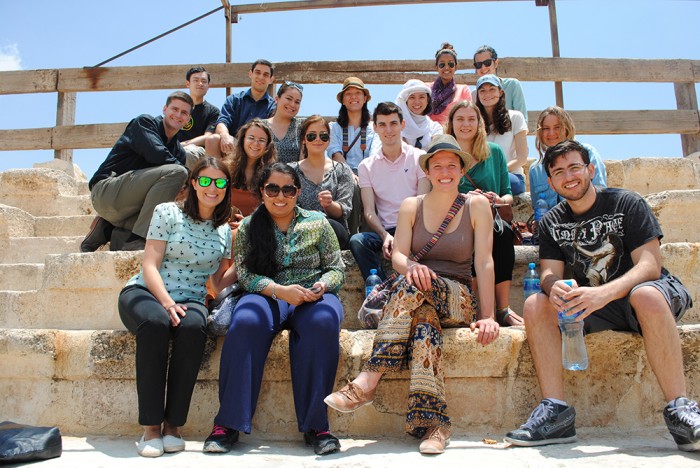 The CEO Amman group poses for a photo at Jerash, in the north of Jordan. Front Row: Jennie Preis, Doreen Mohammad CC’15, Alex Swift CC’15, Jamil Muna CC’15; 2nd Row: Brina Seidel CC’15, Lilia Cherchari CC’15, Chris Godshall CC’15, Kiersten Gourlay SEAS’15, Cordelia Long GS’16; 3rd Row: Mischa Beumer GS’14, Amanda Dancer CC’15, Monica Carty CC’15, Sheiling Chia CC’16, Allison Kammert CC’15. Back Row: Qingxiang Jia SEAS’15, Lucas Oliver CC’15, Meghna Mukherjee CC’15, Tina Garrity CC’15. Photo: Courtesy Meghna Mukherjee CC’15
The CEO Amman group poses for a photo at Jerash, in the north of Jordan. Front Row: Jennie Preis, Doreen Mohammad CC’15, Alex Swift CC’15, Jamil Muna CC’15; 2nd Row: Brina Seidel CC’15, Lilia Cherchari CC’15, Chris Godshall CC’15, Kiersten Gourlay SEAS’15, Cordelia Long GS’16; 3rd Row: Mischa Beumer GS’14, Amanda Dancer CC’15, Monica Carty CC’15, Sheiling Chia CC’16, Allison Kammert CC’15. Back Row: Qingxiang Jia SEAS’15, Lucas Oliver CC’15, Meghna Mukherjee CC’15, Tina Garrity CC’15. Photo: Courtesy Meghna Mukherjee CC’15
Although Jordan has enjoyed relative peace over the years, it is currently surrounded by escalating violence beyond its borders. The Israeli-Palestinian conflict has been unfolding for decades, and as the violence grew this summer, I found myself more disturbed, yet more active, than ever. Being so close to the conflict — quite literally being able to see the land at the heart of the conflict — was uncomfortable and shocking. I lay on my back, floating in the Dead Sea, my luxury resort to my left and the mountains of Israel/Palestine on my right. There was something unsettling about being able to relax in one of the most beautiful natural wonders while simultaneously knowing that just across the water were decades of fighting and bloodshed. I took the opportunity to further inform myself about the conflict, but the most useful and rewarding experience continues to be the conversations I had with those around me — fellow student interns and Jordanians alike mutually encouraging one another to be critical of existing narratives. That these conversations occurred largely via Facebook added an interesting dimension to my communications internship; to me, it demonstrated the power of constructive discussion and rationality in fostering progress.
My summer as a participant in CEO Amman was exciting, educational and enlightening, to say the least. The city truly grew on me, and I hope to keep a part of it with me now that I am back on campus in New York. Boarding at Queen Alia Airport was a bittersweet moment; I was looking forward to my senior year at Columbia, but already missed my life in Amman. My experience in Amman was more than just an internship; it helped me realize the direction in which I want to guide my career after graduation. Although I am still unsure about where I want to base my post-graduation job, I know that I would like to work in the niche of organizational development and fundraising within the human rights field. I am currently pursuing my dream internship at Human Rights Watch in New York in the same position that I held while interning for the King Hussein Foundation, and am grateful to CEO Amman and the King Hussein Foundation for paving the way.
Meghna Mukherjee CC’15 is a senior, majoring in sociology and concentrating in human rights. She is originally from India, but has grown up in the Middle East and Singapore. Meghna is a co-president of Columbia Child Rights and is currently interning at Human Rights Watch in New York.